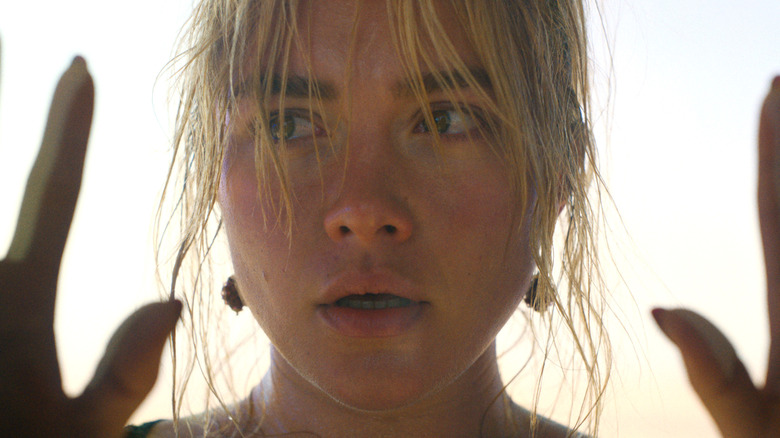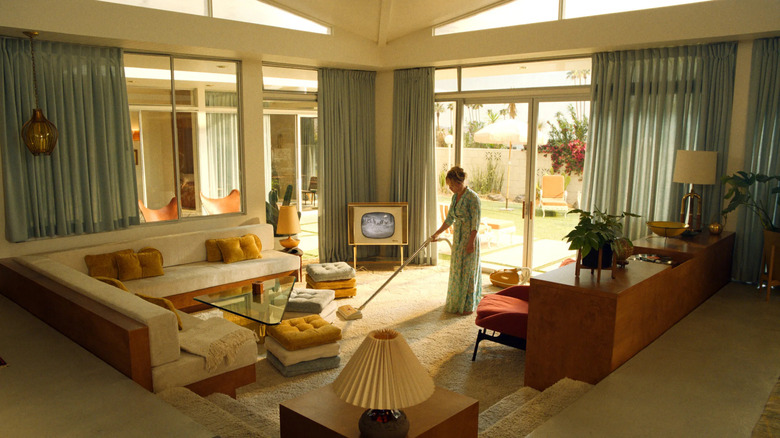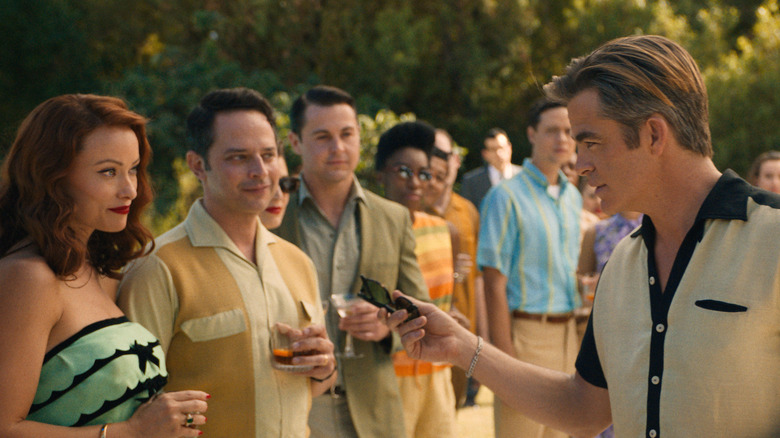Don't Worry Darling Review: Traditional Values
- Fantastic performances from Florence Pugh and Chris Pine
- Lovely Matthew Libatique cinematography
- Thematically inconsistent
- Hinges too critically on its final act twist
- Rough pacing
A simple google search about Olivia Wilde's sophomore directorial effort "Don't Worry Darling" proves a pretty depressing truth: This is a film whose backstage drama and salacious production stories have eclipsed whatever these creatives set out to make in the first place. Despite being one of two films Warner Bros. Discovery can afford to release for the rest of 2022, despite all the marketing dollars spent pushing it to the masses, few people seem to know anything about it beyond that pop sensation Harry Styles is in it and it looks kind of like "The Stepford Wives."
Even more unfortunate, "Don't Worry Darling" doesn't have much more than that going on upstairs.
The film stars Florence Pugh as Alice, a young housewife in the 1950s, living in the company town of Victory, California, with her husband Jack (Styles). It's a quaint, harmonious little community right out of a Norman Rockwell painting, where all the wives are pals and all the husbands leave at the same time every day to work for the mysterious Victory Project, helmed by its enigmatic founder Frank (an exemplary Chris Pine). But something about this idyllic world is amiss.
The viewer will spend a significant fraction of the film's runtime trying to figure out what the "deal" is about this mysterious place, to find out what is lurking beneath the many cracks in its all-encompassing façade. But the answer to all those burning questions proves too blunt and unimaginative. What could be a haunting exploration of the gender wars and the evolution of social mores in American society instead amounts to little more than a watchable enough episode of "Black Mirror," a paper-thin pastiche with Rod Serling ambitions but a Netflix original execution.
Lana Del Rey would love it here...
It's a good thing that Florence Pugh, among her many talents, possesses such a naturally compelling screen presence. Her Alice, as written, is pretty flat and dry as a protagonist. But all Wilde has to do is let the camera linger on her face, hold a second too long as Alice's mind drifts throughout a typical day of cooking, cleaning, and poolside gossip, and Pugh can handle the rest. Too bad that's not enough.
"Don't Worry Darling" is a film that happily drapes itself within the warmth and comfort of '50s Americana, wrapping layer upon layer of loving, period piece homage like so many security blankets. Wilde, cinematographer Matthew Libatique, and production designer Katie Byron have a blast recreating the iconography of this bygone era, fussing over the clean lines of the time's architecture, its home décor, and its fashions. All this slavish attention to detail is meant to juxtapose with the persistent, unsettling tenor of the film's premise.
From the minute we meet Alice and begin to watch her day-to-day routine — one mirrored by every other woman in the cul-de-sac — listening to the motivational speeches on the radio from their collective husbands' boss Frank, we can tell that something is just not right. The methodical plot takes it precious time picking away at these misleading appearances, as Alice seems to be the only person concerned by former friend Margaret (Kiki Layne) and her erratic behavior.
Margaret had some kind of incident involving her now-missing son and her venturing out into the desert outside the town that no one is allowed to go to, but everyone else is content to ostracize and ignore her as much as possible. Except Alice. Alice starts to look at her surroundings differently, especially after seeing a particularly traumatic moment with Margaret the rest of the town denies even occurred.
She begins to zone out at dance practice while making meals and scrubbing walls. But why is she so concerned? She lives in a beautiful home with a handsome husband who drenches her with physical affection first thing when he gets home from work every day. Maybe her husband's boss is a bit dramatic on the local radio every day. No, she has no earthly idea what her husband does at work — what, in fact, anyone's husband does at work — but everyone adheres to the same nebulous but motivational agitprop Frank asserts over the airways. They're all special and motivated, and they're going to change the world.
But Alice can't stop asking questions, probing further, making herself the same kind of outcast Margaret was. By the time she actually ventures out into that same desert and sees things she's not meant to see, we know it's over for her, even if we don't yet know why.
But that "why," well, that's really the crux of the problem, isn't it?
That sounded better in my head
There's no reason to actually spoil this film's twist to engage with why it doesn't work. Because it's not really the twist itself. It's every creative decision made within the film and how badly it contradicts the themes implied by that twist.
"Don't Worry Darling" began its life as a script on 2019's "Black List," a collection of unproduced screenplays buzzing about the marketplace. Written by Carey and Shane Van Dyke, it was a much more straightforward sci-fi thriller, one that gives the game away roughly 20 pages in and then spends the rest of its story wringing drama from that reveal and building tension and intrigue from giving readers the "how" and making them yearn for the "why." As written, it's a pretty low-brow, low-hanging fruit endeavor, the sort of story that would make a great "Outer Limits" episode if a streamer rebooted that to compete with "Black Mirror" and Jordan Peele's "Twilight Zone" reboot.
But Wilde and "Booksmart" co-writer Katie Silberman gave the entire picture a facelift. They chose to tweak and augment the original twist in a way that could be better mined for modern social commentary. It's just told in such a tone-deaf, self-satisfied manner as to be borderline insulting, given the nuance necessary to unpack the ideas it so casually presents.
In interviews, Wilde proudly boasted about how no men are sexually satisfied in this film and how important she found it to explore female sexuality and power on screen. No objections here about multiple scenes showing a woman receive pleasure on camera, but once the viewer makes it to the final act of "Don't Worry Darling," the film's sex scenes take on a very different meaning, and her pop feminist pandering in the media seems more insulting than revelatory. There's a kind of empty-headed auteurism at play here, with Wilde taking a genuinely fascinating set-up about the nature of this world these characters inhabit, then proceeding to populate the picture with a litany of wrong-minded stylistic choices that undermine those themes at every turn.
Why are so many of the supporting cast members played by comedic character actors? This is a move one would imagine is designed to call to question the validity of Victory's surface, but that specific concept is not more openly engaged with. Why is the lone Black character with an actual speaking role the one who is first ostracized? It's clear Wilde didn't think through the optics of this, or really, most of the things that happen on screen in this film.
While "Don't Worry Darling" is an abject failure in storytelling, it is perhaps the most important feature directed by a woman since Ava DuVernay's "A Wrinkle in Time." Roughly 15 years ago, director Karyn Kusama got practically blacklisted after the back to back failures of "Aeon Flux" and "Jennifer's Body," the latter of which would be re-litigated in the court of public opinion over time. But here, two decades into a new millennium, DuVernay, a Black woman, was able to flop critically and commercially without her stock dropping in the industry. Now, Wilde gets to do what male directors have done for nearly a century: make flimsy statements about a middling film she's made while thrusting her undeserving lover into a leading role, no matter how crummy he is at the job.
Cynicism aside, "Don't Worry Darling" is a fine vehicle for Pugh, an actress who keeps surprising us every time out, but little more. The buoyant energy Wilde brought to her debut effort is nowhere to be found here, but it's hard to fault her ambition, even if the finished product leaves so much left to be desired.


